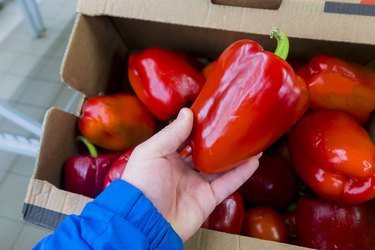
Fresh produce can pick up harmful bacteria from many places, like dirty soil or dirty cutting boards, says the U.S. Department of Health and Human Services. Because of this, using care when choosing, washing and storing bell peppers can help keep your produce fresh and protect you from illness.
While it's best to store your peppers whole until you're ready to eat them, there are some things you can do to keep your peppers fresh after cutting if you need to prepare them in advance.
Video of the Day
Video of the Day
Choosing Your Peppers
Vegetable longevity starts with choosing the freshest peppers in the store or at the farm stand. While peppers come in different varieties and colors, like red, yellow and green, the College of Agriculture and Life Sciences at Arizona State University notes that the guidelines for selecting them are the same across the board. Look for peppers that:
- Have firm skin without any wrinkles
- Feel heavy for their size
- Have a fresh, green stem
On the other hand, you should avoid peppers with any sunken areas, cuts, black spots or soft, bruised areas. These are indications that the pepper is already spoiled, or on its way to spoiling, and it won't last as long as other, fresher peppers, especially after you cut it.
Preparing the Peppers
Once you've picked out the perfect pepper, the next step to ensuring they stay fresh even after you cut them is proper preparation. Before handling the peppers, wash your hands properly to remove any dirt or bacteria that can get on the peppers and cause them to spoil faster. The PennState College of Agricultural Sciences notes that the trick to proper hand washing is to use hot, soapy water and scrub them for at least 20 seconds.
After your hands are adequately washed, wash the pepper with cool water to remove any dirt, residue and microorganisms that may be stuck to the skin. While there are vegetable washes available, the PennState College of Agricultural Sciences points out that these washes haven't been proven to be more effective than water at removing substances on the surface of your pepper.
Storing Bell Peppers
When your pepper is clean, dry it off with a paper towel or a clean cloth. This can remove any leftover bacteria that may be present and help prevent the pepper from spoiling too quickly, according to the University of Missouri Extension. Place it on a clean, sanitized cutting board that hasn't been in contact with any raw meat or dirty produce. Use a clean knife to cut the pepper in slices.
Once they are sliced, the best way to store green peppers, or any other peppers, is in an airtight container or sealed plastic bag. You can also put them in a bowl and seal them tightly with plastic wrap.
Once they're properly sealed, place them in the crisper or produce drawer away from any raw meat or cooked food. Make sure your refrigerator temperature is set to 40 degrees Fahrenheit or below and try to eat the peppers within a few days after slicing them. You can also apply this process to storing cut carrots, celery and lettuce.
- University of Missouri Extension: "How to Keep Fruits and Vegetables Safe"
- Texas Cooperative Extension: "Safe Handling of Fresh Fruits and Vegetables"
- U.S. Department of Health and Human Services: "Food Safety by Type of Food"
- PennState College of Agricultural Sciences: "Proper Care and Handling of Fruits and Vegetables From Purchase to Preparation"
- College of Agriculture and Life Sciences at Arizona State University: "Bell Peppers"